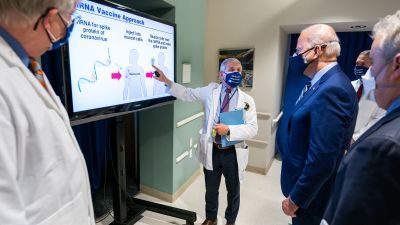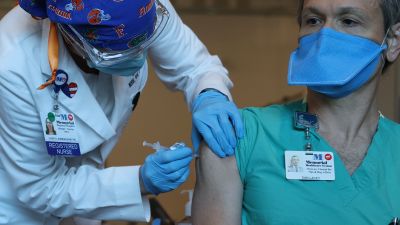
This article is adapted from Unsanitized: The Election Daily Report put out by The American Prospect. You can find the original publication here.
First Response
First off and most important, the FDA advisory committee recommended the Pfizer vaccine for emergency use authorization, and the FDA gave every indication that they would approve the recommendation as early as tomorrow. (Today would be good too!) It was a great day for science and next week, when the Moderna vaccine is approved, that will also be a great day.
Now there have been a couple setbacks. Sanofi/GlaxoSmithKline, which was one of the six vaccine manufacturers from whom the US had guaranteed purchases of doses, pushed back their timeline significantly, after disappointing results in a stage three trial. And India declined accelerated approval for the AstraZeneca vaccine, whose results had been not as good as Pfizer or Moderna but promising, and also confusing because of a dosage issue.
Overall, however, you have to be happy that we’re in a position to think about how to make sure people come back for their second shot rather than how long we’re going to have to wait for an effective vaccine. It’s the beginning of the end of a terrible virus.
But is it only the end of the beginning for the developing world?
There’s a serious concern that rich countries are hoarding the vaccine and making it impossible for the developing world to access. There’s a proposal before the World Trade Organization to suspend all patent rights on coronavirus vaccines, due to the exceptional nature of the pandemic. And the US, UK, EU and other nations are blocking it, despite a majority of nations in support. Remember that the successful vaccines we have were all developed with at least some public funds, and buoyed by public purchasing commitments. So the rich nations are blocking universal access so the public, who paid for the vaccine once, will have to pay twice.
Moderna says casually that they will not enforce any of its patents, but they also will not supply the detailed information needed to replicate the vaccine. AstraZeneca has stated it won’t make a profit on the vaccine for the duration of the pandemic, but has the ability under that standard to call an end to the pandemic early. This is a replay of how HIV drugs were limited in the developing world, and generics crushed to maximize pharmaceutical profits.
The New York Times gave a pharma lobbyist a chance to respond to this, that there wouldn’t be increased supply from suspending the patents so we shouldn’t do it, along with the familiar argument that lack of patent protection would stunt innovation. Suspending the patents would actually massively increase production of the vaccine, of course, bringing into play pharmaceutical plants around the world. We should have been investing massive amounts of money all for vaccine production and still should, refashioning plants to produce it. Patents are one reason why that’s unlikely to happen; even if the companies license out production, it will be done in limited ways to increase prices and profits.
This extends to treatments. We’re already seeing how Trump cronies are among the only people able to access monoclonal antibodies right now. These of course are patent-protected and reliant on manufacturers that are unlikely to allow generic production.
As for the long-run threat to innovation, considering that these companies used public money to develop the vaccine, and it worked in record time, the only thing that should be questioned is the current patent-based system. Innovation seemed to work fine with what amounts to a public process.
Dean Baker has a much more thorough review of this important debate. The vaccine example should offer a lesson: the way we commonly develop and distribute prescription medications, the for-profit, patent-based approach, isn’t locked in as the only option.
Winners and Losers
It appears that there’s some minor movement on a skinnier-than-skinny deal on COVID relief. The bipartisan $908 billion proposal is all but dead. This new effort would include “noncontroversial” items like a resumption of the PPP, some money for schools and health systems, and maybe an extension of the two expiring unemployment programs. (Hey, I know what’d noncontroversial: getting the vaccine out to everyone!)
Let me not irresponsibly raise hopes. This is talk, not necessarily action. Congress has shown itself incapable of addressing significant challenges, as the leadership—in this case, Mitch McConnell—would rather watch the world burn. I get his impulse to destroy a Biden presidency, but he is materially risking the loss of his Senate majority in order to do it.
Sometimes, however, you just have to keep it simple. And Kevin Drum did that with a revelation from the Federal Reserve’s Flow of Funds report. It shows that, when looking at national income, corporate profits and “proprietors’ income,” have both soared past their expected growth despite the pandemic. Employee compensation, meanwhile, has yet to fully recover. The transfer from workers to owners is about $40 billion.
I keep hearing about this historic rescue package called the CARES Act that saved the country and the little guy. My point all along was that it was temporary. The chart in Kevin’s piece is a graphical depiction of how CARES wasn’t enough. Tear away the aggregates and you have a rescue that improved corporate balance sheets and manager compensation at the expense of workers. Analysts expect this to continue into 2021. So why would Republicans give a damn about more relief?
Days Without a Bailout Oversight Chair
259.
Today I Learned
- State programs to rescue small business are not likely to have enough impact. (New York Times)
- Why a trucking company with private equity ownership got a national security loan remains one of the bailout’s enduring mysteries. (Wall Street Journal)
- CDC official told to erase evidence of White House involvement in the regulatory process. (HuffPost)
- The Lee Fang beat: lobbyists angling for “essential worker” vaccine status for their industries, and entertainment lobbyists getting special treatment in California. (The Intercept)
- States stepping in to provide corporate immunity on COVID lawsuits, as the federal government has stalled. (National Law Review)
- Two Americas: mortgage originations on track for the “best year ever.” (Wall Street Journal)
- New Hampshire’s House Speaker dies from COVID-19. (Boston.com)




